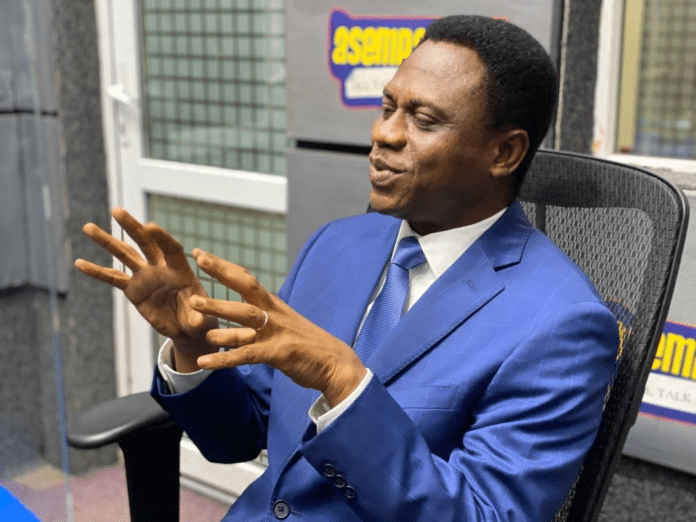
The Ghana Pentecostal and Charismatic Council (GPCC) has said there is an urgent need to downsize government machinery and cut down on expenditure to build confidence to address the country’s economic challenges.
The ecumenical body also emphasised the importance of the government demonstrating a strong sense of burden-sharing to encourage key bondholders to fully accept the domestic debt exchange programme (DDEP) voluntarily to help the country make its debt sustainable.
“This should include the government explicitly and verifiably cutting down on its expenditure, including reducing the size of government, among other areas. This is very critical to encourage the buy-in of the public,” a communique issued at the end of the GPCC’s Conference of Heads of Churches and Organisations (CHCO) Extraordinary National Delegates Conference said.
The communique, signed by the newly elected President of the GPCC, Apostle Eric Nyamekye, said it was the view of the 2023 CHCO that the economy of Ghana was presently in dire straits, and that the government could not approach the resolution of the current economic situation in a business-as-usual manner.
Event
The CHCO, held at the Pentecost Convention Centre at Gomoa Nyanyano in the Central Region, was on the theme: “United for God’s Glory”.
Chaired by Bishop Dr Gordon Kissieh, it deliberated on some pertinent issues prevailing in the country and of concern to the nation, among others.
They included the DDEP, worsening macroeconomic indicators and their effect on the livelihood of the citizenry and the Auditor-General’s Report of 2021 which, it said, brought to the fore a considerable degree of misappropriation in public sector institutions.
Speakers at the conference included Apostle Dr Aaron Ami-Narh, Apostle General Most Rev. Sam Korankye-Ankrah of the Royalhouse Chapel International and Bishop Dr Kisseih of the Life International Church.
An environmental and natural resources expert, Dr George Manful of the Frimpong-Manso Institute, also made a presentation on the devastating effects of galamsey and environmental pollution in the country.
At the end of their deliberations, the delegates issued a communique.
Interest of citizenry, state
The communique said every effort must be made to carry the citizenry along in decision-making processes.
“This will promote confidence in our governance architecture and ensure that every stakeholder commits to contributing to the solution. Indeed, the role of government is to work for the interest of the citizenry and the state,” it said.
The ecumenical body said policies of governments should promote the good of the citizenry, rather than merely for the political party of the government.
It urged the government to review its major flagship programmes, in the light of the current economic challenges, as a means to resolving the difficulties the country was going through.
Additionally, it called on the government not to make the national interest subordinate to the interest of a political party.
National forum, financial sector
The communique supported calls for a non-partisan national consultative forum to dispassionately discuss and gather ideas to address the prevailing socio-economic and environmental challenges.
While acknowledging the proposal to set up the financial sector stability fund as a measure to provide support for the financial sector, the council said it expected to see a clear demonstration that the facility was fully funded for implementation in order to provide full assurance for the financial sector and the banking community.
“Whatever form the DDEP takes, the government should ensure that the financial sector, a key pillar of growth in the economy, is not destroyed in the process.
“The council is concerned that key vulnerable groups (pensioners, individual small savers, among others) are not being adequately protected in this DDEP.
“The council will encourage the government to ensure that the financial sector, which has been restructured more recently, and vulnerable groups are fully protected in the design of the programme in order to limit the burden on such groups,” it stressed.
2021 Auditor’s Report
Expressing concern over the many infractions contained in the 2021 Auditor-General’s Report, the council called on the government to work with the relevant law enforcement agencies to retrieve all funds that the report cited as being unaccounted for or misapplied.
“The Auditor-General should exercise its authority to disallow any item of expenditure which is contrary to law and surcharge the disallowed expenditure on the person(s) responsible for incurring or authorising it.
“The Office of the Attorney General should take urgent steps to prosecute all persons against whom allegations of corruption and malfeasance have been made to serve as a deterrent to others,” the communique emphasised.
Similar call
Last month, the Ghana Catholic Bishops Conference made a similar call in a statement, urging the government to come up with interventions that would support, rather than worsen, the plight of the vulnerable.
The conference called on the government to urgently suspend all non-essential projects being carried out, reduce government appointees and also review the free SHS policy to bring relief to Ghanaians.
It said having followed with interest recent happenings in the country on the economic front and its impact on Ghanaians, it was concerned.
“Therefore, we find it necessary to add our voices to calls on the government to take steps to find solutions that are less burdensome on Ghanaians, and yet sustainable, to get the country out of this economic quagmire,” the conference said.
